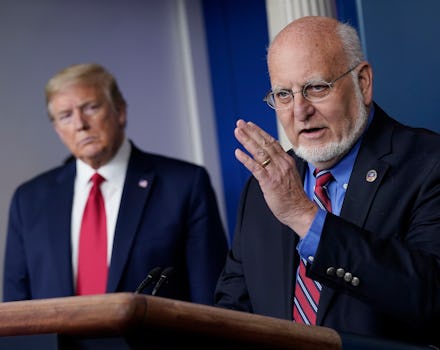There probably won’t be a COVID vaccine available this year, despite what the White House says

It is both an extraordinary and unfortunate fact that we live in an era where I can accurately say the following: The President of the United States is once again contradicting a highly accomplished doctor in his own administration, in the midst of a global pandemic. Terrific.
This time, the president — who, I should stress, has zero medical qualifications beyond reportedly believing that human beings are born with a finite amount of energy which can be depleted by things like "exercise" until a person quite simply drops dead — is plunging headfirst into a painfully stupid pissing contest with Dr. Robert Redfield, a physician of more than 40 years with an expertise in virology who currently serves as the head of the Centers for Disease Control and Prevention (CDC) — arguably the most influential and powerful doctor in the country.
Testifying before a Senate appropriations subcommittee this week, Redfield described how mask-wearing, which the president has pointedly eschewed, could very well be more effective at stymying the spread of the coronavirus than the much-hyped-by-Trump COVID-19 vaccine.
"I might even go so far as to say that this face mask is more guaranteed to protect me against COVID than when I take the COVID vaccine, because the immunogenicity may be 70%, and if I don’t get an immune response to a vaccine it’s not going to protect me,” Redfield testified. “This face mask will."
Redfield also echoed Dr. Moncef Slaoui, the top scientist on Trump's "Operation Warp Speed" coronavirus vaccine initiative, who wrote last month in The New England Journal of Medicine that large-scale distribution of any such vaccine would likely take place "by mid-2021."
"I think we have to assume that if we had a vaccine, say, released today, that it’s going to take us probably in the order of nine months, six-to-nine months to get the American public vaccinated," Redfield testified, citing the importance of reaching a critical mass of people with immunity in order to reasonably quash the virus' spread.
Not exactly good news, but it certainly seems plausible — even reassuring — considering the source: a real, accredited, accomplished doctor.
And then there's the president, who kneecapped Redfield's measured optimism with his seemingly pathological need to be both right and first, no matter the consequences.
"It’s just incorrect information," Trump — neither a physician, scientist, nor logistics expert — told reporters on Wednesday. "When he said it, I believe he was confused," he added. "It's going to be a much faster distribution process."
Since then, some members of the GOP and Trump administration quickly lined up to trip over one another in support of the president's unique understanding of the passage of time.
"If I just take the words of the CDC and the president, the president is right," Republican Congressman and House Minority Leader Kevin McCarthy said during a news conference. McCarthy, as you might have guessed, isn't a doctor either.
Mark Meadows, the president's current Chief of Staff, echoed McCarthy's bravado, telling Fox News on Thursday that "if I were a betting man, I’d bet on President Trump based on what I know behind the scenes, how quickly we’re moving on the clinical trials." He also declared the White House was aiming to have 100 million vials of the still non-existent coronavirus vaccine ready in the next month-and-a-half.
While it's true that clinical trials have been moving extraordinarily quickly, the fact remains that less than 10 of the more than 100 COVID-19 vaccines currently in development are in the crucial large-scale efficacy phase. And the vaccine development process is vulnerable to hiccups and pitfalls, as pharmacology giant AstraZeneca demonstrated earlier this month when they were forced to temporarily halt testing on their coronavirus vaccine after a trial patient reportedly developed a potentially related health condition during the process. The good news: AstraZeneca is one of nine vaccine makers that recently pledged to prioritize safety and not cave to political pressure to rush a vaccine.
Ultimately, given Trump's penchant for performative pre-election stunts that are more about making it look like he's doing something rather than actually accomplishing anything, it seems best to take the administration's flurry of election-proximate promises of a theoretical vaccine with a healthy dose of skepticism.